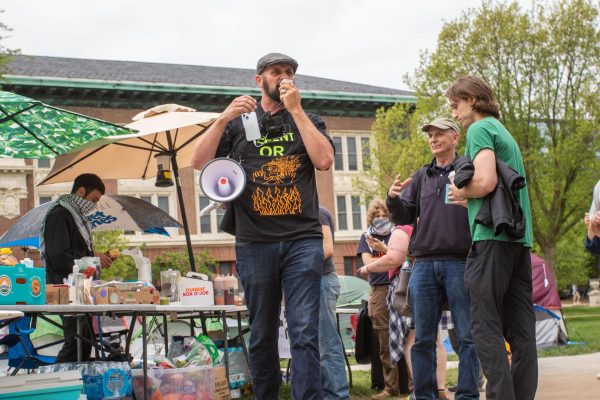Opinion | Stop individualism from destroying America
Photo courtesy of John M. Cropper/Flickr
A tattered American flag sways at Wilmington’s Sugar Grove Cemetery on Oct. 28, 2010. Senior Columnist Jude Race suggests that people should work more as a collective in America rather than isolating ourselves from one another.
April 29, 2022
In a recent column on climate change, The Daily Illini Editorial Board summed up our burnt and flooded world’s prognosis: “We are screwed.”
With a similar sentiment, Americans provide a gloomy forecast for their financial future, with a majority of young adults believing they’ll be worse off than their parents. Despite this economic pessimism, 61% of Americans think 2022 will be better than last year. Nonetheless, it’s worth noting this figure was 6% higher in 2021.
Likely worsening with evictions and unemployment during COVID-19, homelessness has trended upwards since 2016. Those who can find jobs often don’t earn enough to support themselves anywhere in this so-called “land of opportunity.” Yet society places the onus on individuals to support themselves, disregarding factors limiting their employment options, like disabilities or parenthood.
Driving this attitude of strict self-sufficiency — and the issues precipitating from it — is individualism, a sentiment deeply entwined with the red, white and blue fabric of American society.
Our persistent pursuit of personal progress comes at great expense to societal development. We are encouraged to go through life with an “I got mine, you get yours” mentality; hustle culture exemplifies this mindset.
Get The Daily Illini in your inbox!
Those who can’t keep up with the unrealistic demands placed on today’s workers fall by the wayside, labeled as burdens, failures and burnouts.
This waking American nightmare has revealed the naïve dream once standing in its place to be a mirage built on the half-true guarantee of success for hard work. But the American dream doesn’t have to be a lie; fostering a balance of collectivist and individualist thought will help us identify widespread problems and effectively mitigate them with effort and compassion.
To start fostering more collectivism, talk with people you don’t know well. While many of us fear speaking with strangers, we’re happier after doing so. We also experience a subsequent boost in our empathy.
Positive interactions and empathy are key to dampening individualism’s septic byproducts. Treat others like living, breathing humans with feelings and desires instead of gliding past like they’re a side character in your story, and you’ll care more about society’s well-being.
Additionally, use social media less. People who use social media often feel more socially isolated. And social media can fuel issues like body dysmorphia and eating disorders when we fall into unhealthy cycles of comparison.
Feeling anxious about eating and our bodies deepens isolation further, causing a downward spiral of self-loathing. When we have these internal crises, we have less energy to care for the people around us; unplugging gives you back energy better used on taking care of yourself and your community.
Lastly, recognize the bonds we share as Americans. While this seems unpalatable in our polarized environment, it is essential to see ourselves as an interdependent collective instead of a loose union of independent persons.
For instance, most of us grew up watching “SpongeBob SquarePants” on TV. More broadly, many Americans enjoy barbecue, though there is no consensus on which style is best despite Kansas City easily beating the rest. But simply talking with strangers about SpongeBob or barbecue builds trust across our daunting social divides.
All it takes is a little conversation to appreciate the importance of togetherness and undo the wrongs of rampant individualism. It’s like we see ourselves as one screw helping all the other screws to hold a roof up — none of us could do it on our own.
If we think like this — as one screw out of many — unlike what the Editorial Board said, we may not be so screwed after all.
Jude is a senior in LAS.







